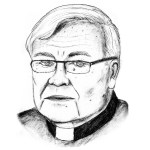Derek Jeter will retire from the New York Yankees at the conclusion of this season. You don’t have to be a Yankees fan (full disclosure, I’m not) to recognize that Jeter’s professional career has been remarkable and his professional demeanor admirable.
Both aspects of Jeter’s accomplishments were eulogized in a column by famed baseball essayist Roger Angell in a recent issue of The New Yorker. Angell described Jeter’s anticipated farewell appearance in these words: “He lifts his cap to the cheering, phone-flashing multitudes without the weepiness of some predecessors. His ease, his daily joy in his work, has lightened the sadness of this farewell, and the cheering everywhere has been sustained and genuine.”
I grew up in Cleveland, Ohio, inheriting deep, longtime family loyalty to the Cleveland Indians. I entered the Jesuits in the summer of 1948, just prior to the Indians winning the World Series. My sadness at saying good-bye to family and friends was eased by the realization that I’d see them all again. But the sadness at missing the Indians win the pennant was more permanent because I doubted I’d ever see them win another pennant. I was right!
While never an accomplished athlete, I loved baseball. I loved the egalitarian ritual of every player getting a chance to bat, an opportunity to run the bases and to field a game. I loved also the ritual of going to the now-demolished Cleveland Stadium to watch great players like Bob Feller, Bob Lemon, Lou Boudreau and Jim Hegan spark the Indians into the pennant race.
Even today, I feel personally attacked when someone complains that baseball is too slow. For as a kid I loved the very measured pace of the game because it gave me time to have a hot dog and a Coke, to listen to my parents discuss their grownup world, to sit in a crowd who loved the game too. Baseball has a secure place in my memory and in my heart.
Consequently, when I read Roger Angell’s tribute, it reminded me of how I grew up, admiring those who made baseball an art and not just a game. It also reminded me that doing well is made even better when skill transcends performance and becomes a graceful statement of values and ideals.
These baseball reminiscences triggered another set of reflections. Whenever I hear people claiming the importance of finding God in all things, I want to ask them — as I ask myself — can you really find God in all things without first finding “the thing” in all things? Does transcendence in the face of God come because we have ignored the face of the human before us, with us, and — yes — in us? In its better moments, religion invites us to take time to honor not simply the reality beyond us, but the reality in front of us.
In the Church, we honor water, and bread, and wine, and the human voice or gesture of commitment. These earthy realities are not to be ignored, but to be held in awe as ways to God. That same sacramental instinct should seep into our ordinary lives — to take the time to use what is before us as well as we possibly can because it can lead us to understand and feel something that is of God. And from my personal experience and history, I’d include baseball.
From everything I know about him, Jeter has made baseball into a statement about living “with grace and style, with ease, and with joy in his daily work.” You cannot live that way without a deeper reverence and delight in all the things that make the game of baseball an event, something that does good for the human heart and satisfies the human mind.
As this Jesuit sees it, in a world tormented by violence and hate, struggling with destructive rivalries and simmering jealousies, and saddened by so many good people without homes or food or even hope for their future, it struck me that Jeter not only played the game with skill, but he also lived it with class. It’s a stretch, but that’s the same quality I discern within Pope Francis — someone who has made being the Bishop of Rome an art, someone who seems to find joy in his daily work. Isn’t that what we all hope education, too, will do for us?
 Fr. Howard Gray, S.J., is the special assistant to the president at Georgetown University. As This Jesuit Sees It … appears every other Friday.
Fr. Howard Gray, S.J., is the special assistant to the president at Georgetown University. As This Jesuit Sees It … appears every other Friday.



















